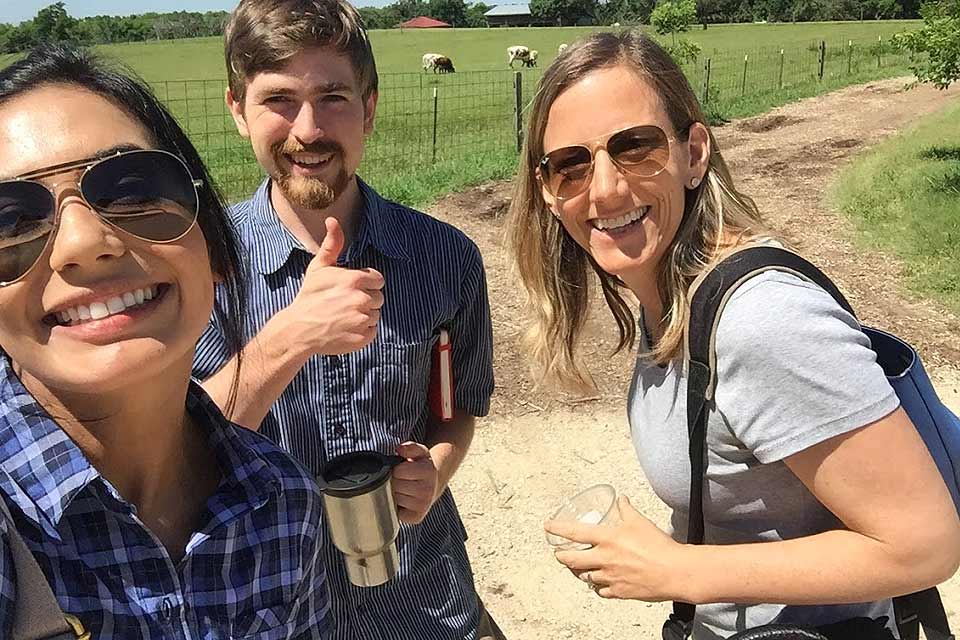SLU Teams with Land Institute and Missouri Botanical Garden on Sustainable Agriculture Project
The Department of Biology at Saint Louis University has been awarded two grants to support a new research project "Global Inventory and Systematic Evaluation of Perennial Grain, Legume and Oilseed Species for Pre-Breeding and Domestication." The grants support ongoing work in the lab of Allison Miller, Ph.D., including a new post-doctoral research associate, Claudia Ciotir, Ph.D.
A $268,000 grant comes from the Perennial Agriculture Project in collaboration with the Malone Family Land Preservation Foundation and The Land Institute (Salina, Kansas). A second grant of $100,000 was awarded by the Saint Louis University Center for Sustainability.
Miller, an associate professor in SLU's Department of Biology, who is also a research associate with the Missouri Botanical Garden, highlighted the importance of the grants.
"These awards will allow us to establish an exciting partnership between Saint Louis University, The Land Institute and the Missouri Botanical Garden," Miller said.
Advancing Sustainable Agriculture
The long-term goal of the project is to advance sustainable agriculture through the incorporation of perennial grain, legume and oilseed species into large-scale contemporary agriculture.
Perennial plants are those that live for and can be harvested over multiple years, in contrast to annual species that are planted each year and are harvested once. Relative to annual species, perennials offer deeper rooting depths, greater retention and utilization of precipitation, and reduced soil erosion.
For more than 30 years, The Land Institute has been promoting perennial polyculture (long-lived plant species grown in mixtures), an alternative form of agriculture that results in reduced soil loss relative to monoculture annual agriculture.
However, perennial grain, legume and oilseed-producing species are not well represented among contemporary domesticates: modern grain and legume crops are annual species, and few perennial members of these families have entered the domestication process.
Developing Perennial Crops
Targeted breeding programs in wild, previously undomesticated species offer one major pathway to the development of perennial crops.
The aims of this project are to identify perennial members of the grass family, the bean family and the daisy family to systematically evaluate wild, perennial herbaceous and shrubby grain, legume and oilseed species, and to develop a prioritized list of candidate species for inclusion in pre-breeding and domestication programs taking place at The Land Institute.
Land Institute scientists Tim Crews, Ph.D., Lee De Haan, Ph.D. and David Van Tassel are working closely with SLU scientists on the project. Scientists from the Missouri Botanical Garden involved in the project include ethnobotanists Wendy Applequist, Ph.D., and Andrew Townesmith.
Identifying Promising Species
Promising candidate species under consideration for pre-breeding and domestication will be identified by extracting and analyzing information obtained from available sources, including literature, online databases, herbaria and living collections.
Other means including collecting and planting out a subset of wild taxa for live plant analysis in The Land Institute greenhouses and fields, and by developing long-term experiments to test evolutionary theory related to how perennial plants respond to artificial selection.
Databasing work on this project has been underway since December 2015 and the first field trials are starting this month at The Land Institute.
In addition to supporting postdoctoral research associate Claudia Ciotir, several students are involved in the projects including SLU biology master's student Sterling Herron, undergraduate students Brooke Micke and Samantha Selby, and an NSF REU student from the Missouri Botanical Garden REU program.
For more information, contact Allison Miller at amille75@slu.edu.
